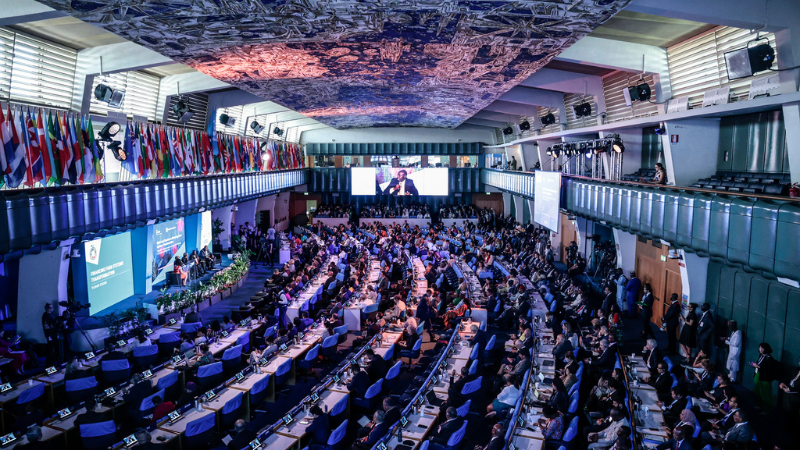The UN Food Systems Summit +2 Stocktaking Moment (UNFSS2023), taking place at the FAO premises in Rome, concluded on July 26 after three days of intensive discussions on how to make food systems work better for people and the planet and advance the implementation of the 2030 Agenda.
The Summit, convened by the UN Secretary-General and hosted by the government of Italy, in collaboration with the Rome-based UN Agencies (FAO, IFAD, WFP), the UN Food Systems Coordination Hub, and the broader UN system, served as the first global follow-up to the 2021 Food Systems Summit, offering an opportunity to assess progress and review commitments made towards the implementation of national food systems transformation pathways.
The World Farmers’ Organisation (WFO) played a significant role in representing the global farmers’ perspective and actively participating in high-level discussions concerning Food Systems transformation and the strides needed to achieve Sustainable Development Goals.
During the event, a WFO delegation, composed of the WFO President, Arnold Puech d’Alissac, the WFO Board Member of the African Constituency, Ms Elizabeth Nsimadala, Ms Josiane Irakarama from INGABO Syndicate, and Mr Daniel M. M’Mailutha from KENAFF together with the WFO Secretary General Arianna Giuliodori and other representatives of the WFO International Secretariat, engaged in several official sessions and events, providing valuable insights to the discussions. WFO also co-organized two side events, the first focusing on the significance of water management for food systems transformation, while the second highlighting the pivotal role of a sustainable livestock sector in promoting more sustainable and equitable food systems.
Here are some highlights:
Monday 24 – FAO Special Event: “Fertilizers: Meeting Short-Term Needs While Working Towards Sustainable Solutions”
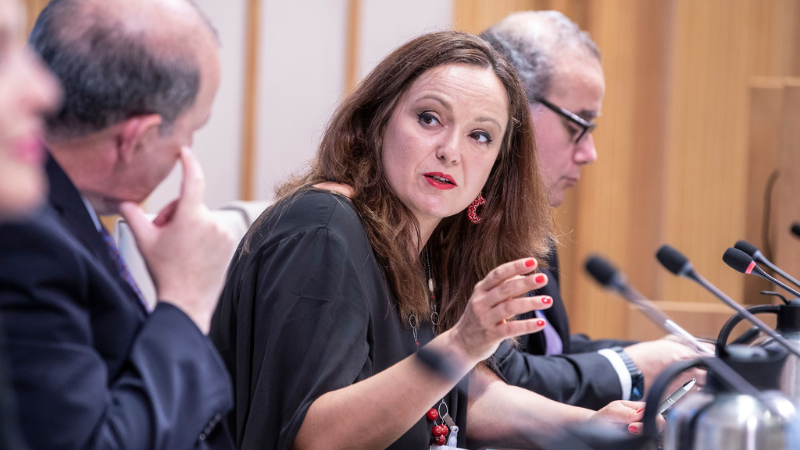
Photo credit: ©FAO/Giulio Napolitano
On Monday, the WFO Secretary General, Ms Arianna Giuliodori, together with Ms Josiane Irakarama, participated in a special FAO event on the fertilizers issue.
Ms Giuliodori started by emphasizing that farmers are the people in the food systems and that a significant majority of them are family farmers. The soaring fertilizer prices, which are still three times higher than before, have direct consequences not only on farmers’ businesses but also on their livelihoods and that of their families. Despite subsidies or support, the late arrival of fertilizers and the inability to meet seasonal needs often make the assistance ineffective.
Additionally, she shed light on the fact that, despite all these challenges, farmers are once again proven resilient and innovative, exploring alternatives, from biofertilizers to traditional indigenous solutions, to cope with this emergency.
To effectively solve this complex issue, Ms Giuliodori stressed the importance of involving farmers and their organisations directly in the decision-making process and enabling them to co-design solutions rather than just being mere recipients of external assistance. It is imperative to empower them so that they are prepared to take the necessary steps everywhere.
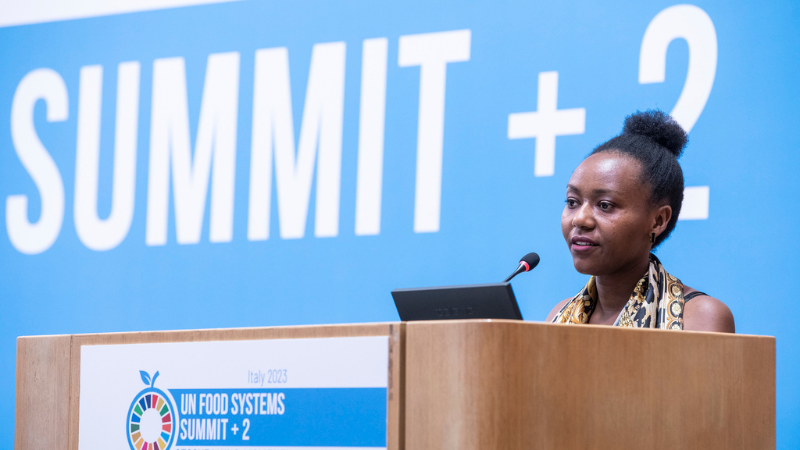
Photo credit: ©FAO/Giulio Napolitano
During the debate, Ms Josiane Irakarama provided valuable insights from the perspective of young farmers. She highlighted the barriers they face in accessing the farming sector and stressed the importance of overcoming those barriers to secure the future of Agriculture. She suggested starting by strengthening local methods of producing food, as well as processing and producing fertilizers.
Monday 24 – Stakeholder Roundtable Leadership Dialogue
On the same day, the WFO SG addressed the Stakeholder Roundtable Leadership Dialogue, organized by the Stakeholder Engagement and Network Advisory (SENA) Group of the UN Food Systems Coordination Hub.
“What is a Food System? It’s about producing and consuming food.
So, it should have producers and consumers at its very centre.” – WFO Secretary General
She highlighted that two years ago at the UNFSS, producers gathered, overcoming their differences, and finding common ground around what is needed. One of the key priorities that emerged was the urgent need to rebalance power in the food value chain. As emphasized by the UN Secretary General, “We have to put people in front of a profit,” underscoring the importance of food systems serving the needs of those producing and consuming food.
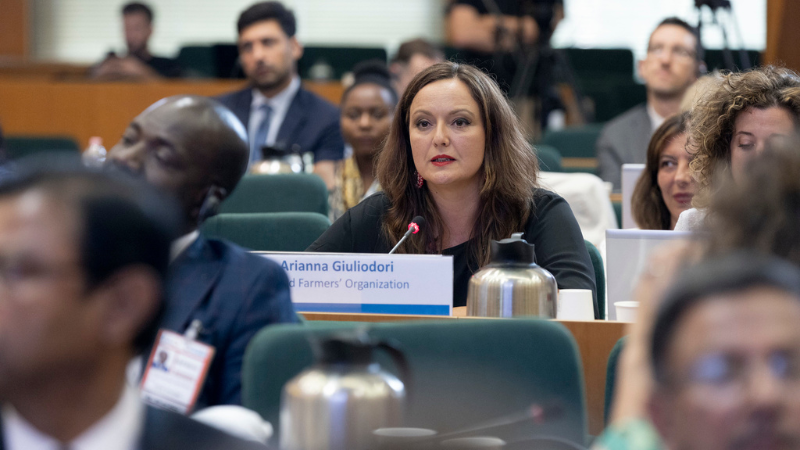
Photo credit: ©FAO/Alessandra Benedetti
She also shed light on how farmers worldwide are tackling challenges such as climate change, extreme weather events, and food security issues by implementing effective on-the-ground solutions. To succeed, it’s essential to involve food producers at the core of the decision-making process, collaboratively designing solutions.
Tuesday 25 – WFO Co-organised Side Event: “How to Make Water Pivotal in Food Systems”
On Tuesday 25, WFO, together with FAO, Wageningen University & Research (WUR), the Government of the Netherlands, the Climate-Resilience Food Systems Alliance (CRFS), the International Water Management Institute (IWMI), and the World Bank Group, co-hosted a side event focused on the vital role of water in food systems and its significance in achieving food security.
The event highlighted the strong connection between food and water, stressing that effective water management is essential for increased food production and food security. The speakers acknowledged the role of farmers as food producers as well as stewards of natural resources, including water.
They recognized the importance of including farmers’ needs and expectations in discussions around water management and farmers’ involvement in relevant decision-making processes. Collaboration among different stakeholders was considered a key to effective and sustainable solutions to the current water crisis.
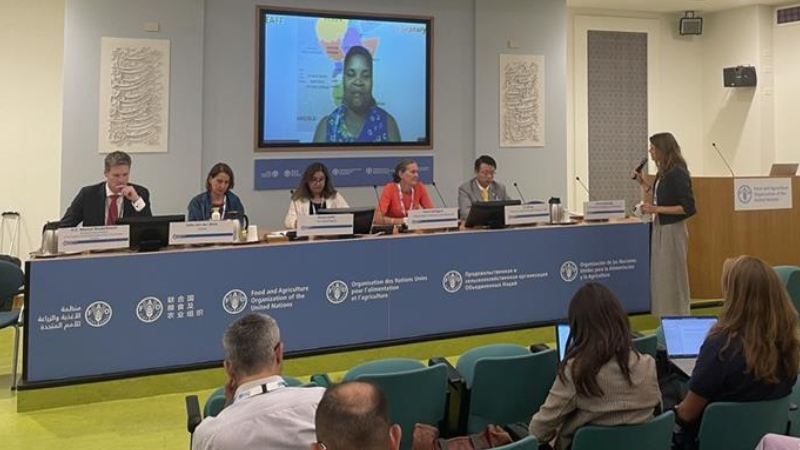
Photo credit: @WFO
WFO Board Member, Ms Elizabeth Nsimadala, highlighted the challenges related to water availability, access, and infrastructure in agriculture. She emphasized the importance of water for all living beings and its critical role in food production. Being a farmer herself and representative of the WFO African Constituency, she showcased examples of farmers’ dedication to ensuring efficient water use and equitable access for all farmers, considering climate change’s impact.
Ms Nsimadala stressed the need for financial and technological support, climate-smart water management technologies, capacity-building, and innovative financing models for farmers to adapt their farming practices. Involving farmers and their organisations in decision-making and priority-setting was seen as essential.
Tuesday 25 – WFO Co-organised Side Event: “The Sustainable Livestock Journey”
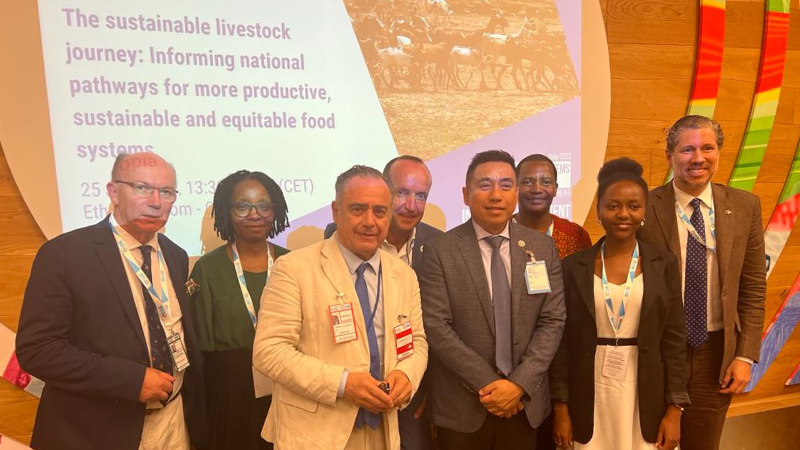
Photo credit: @WFO
On the same day, another WFO co-organised event focused on livestock farming as a critical asset for sustainable, equitable, and resilient food systems. The event, co-organised by WFO, the International Livestock Research Institute (ILRI), the International Dairy Federation (IDF), and the Ministry of Agriculture and Livestock Development of Kenya, emphasised how the livestock sector can drive transformative changes towards more productive, environmentally friendly food systems.
The WFO President, Mr Arnold Puech d’Alissac, together with Ms Josiane Irakarama, contributed by bringing the farmers’ perspective into the debate.
The speakers discussed the contribution of livestock farming to the transition of more sustainable, equitable and inclusive food systems, stressing their importance for food and nutritional security, rural development and economic inclusion, especially for women and youth.
“All Farmers are Activists!” – WFO President
Emphasizing its link with the environment and natural cycles, the WFO President emphasised that “livestock farming holds a huge potential to help us feed the world sustainably”. He called on the audience to see farmers as “activists” advocating for pragmatic solutions to tackle climate change while feeding the world.
Wednesday 26 – “Farmers Markets. A strategic tool to develop resilient and sustainable local food systems”
On the last day of the UNFSS+2 Stocktaking Moment, Ms Arianna Giuliodori joined a side event organised by the World Farmers Markets Coalition (of which the WFO is a founding partner) alongside the Resilient Local Food Supply Chains Alliance, the CIHEAM-Mediterranean Agronomic Institute of Bari and the Italian Ministry of Foreign Affairs and International Cooperation.
The event highlighted the crucial role local fresh food markets play in delivering stability and transforming food systems for sustainability and resilience.
The WFO SG underlined that there’s no dichotomy, no opposition between, short and long value chains. Farmers, irrespective of their scale, seek solutions and opportunities to bring their produce to the market sustainably and nourish the world.
The vast majority of farmers are family farmers, no matter how big or small the farming business is, it’s most of the time a family-led business on the land: “Don’t believe in fake polarisations: for the farmers, the only interest is that the value remains with the farmers”.
For those reasons, farmers widely recognize that short-value chains offer a powerful means of bringing consumers and producers closer together while increasing the value retained by farmers. Simultaneously, they also acknowledge the importance of long-value chains. The WFO SG emphasized that there is no true opposition between the two; instead, the focus should be on ensuring that value stays within the hands of the farmers and their families.
She stressed the significance of not falling for false polarizations or dichotomies and called for a united approach where farmers are placed at the centre of the solutions.
Ms Giuliodori also argued against perceiving urban and rural areas as separate entities, as this creates boundaries that distance farmers from consumers. Instead, the focus should be on understanding that both areas are part of a continuum, and initiatives like the Farmers Market Coalition play a crucial role in promoting sustainability and development.
As the world is running up the UN Decade of Family Farming, Ms Arianna Giuliodori emphasized that initiatives like the Farmers Market Coalition hold immense potential for empowering women and youth in the farming community. Additionally, these efforts create opportunities to provide urban inhabitants with access to healthy food.
The WFO Secretary General concluded by stating that embracing the farmers’ perspective could lead to win-win solutions. Thriving farmers, sustainable development, and satisfied consumers can all be achieved by empowering farmers and supporting initiatives like the Farmers Market Coalition.
Wednesday 26 – “Science and Innovation for People, Planet and Nature”
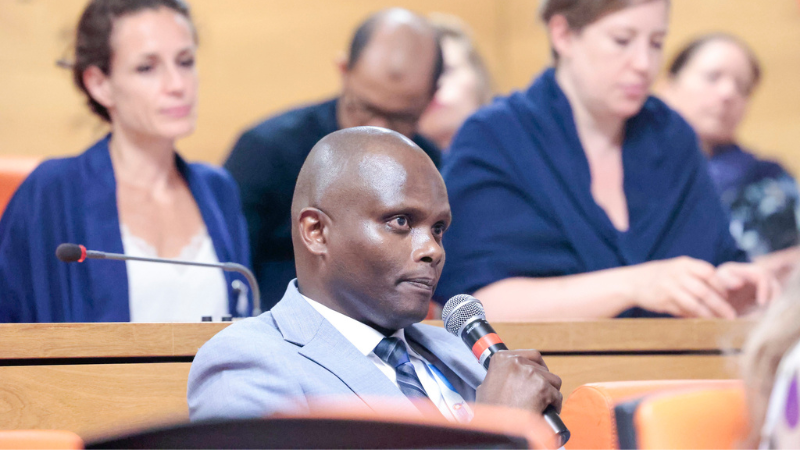
Photo credit: ©FAO/Cristiano Minichiello
In the meantime, Mr Daniel M. M’Mailutha, CEO of the Kenya National Farmers’ Federation (KENAFF), a WFO Member Organisation, joined a side event on innovation co-organised by the Consultative Group for International Agricultural Research (CGIAR) and ClimEat.
He highlighted the challenges faced by farmers in Kenya and the urgent need for action and support in climate resilience and sustainable agriculture. The CEO, who is also a dairy farmer, emphasized the importance of involving farmers directly in initiatives aimed at transforming food systems and building climate resilience.
Mr M’Mailutha expressed concern over the lack of meaningful engagement of farmers in many international discussions and projects. Farmers are often viewed as targets, not agents of change, which hinders their agency and participation in decision-making processes. The speaker stressed the significance of working with farmers at the local level, as they possess essential knowledge about their climate and cultural practices.
In his intervention, he stressed the importance of climate finance, noting that only a tiny fraction of global investments are targeted at farmers in developing countries. He also emphasized the need to improve farmers’ awareness of and access to innovation and technologies.
Without genuine farmer involvement, the success of agricultural initiatives remains uncertain.
Wednesday 26 – Towards the SDG Summit, the Summit of the Future and the 2025 UNFSS+4
During the closing session of the UNFSS+2 Stocktaking Moment, the WFO President delivered a strong statement on behalf of the world farmers.
He urged the audience to acknowledge the complex interconnected nature of our food systems, which include processing, retailing, distribution, and food consumption. Still, none of these systems could exist without farming: “The farming system is the only one that makes sure that food reaches the consumers’ table. Without agriculture, the world cannot survive.”
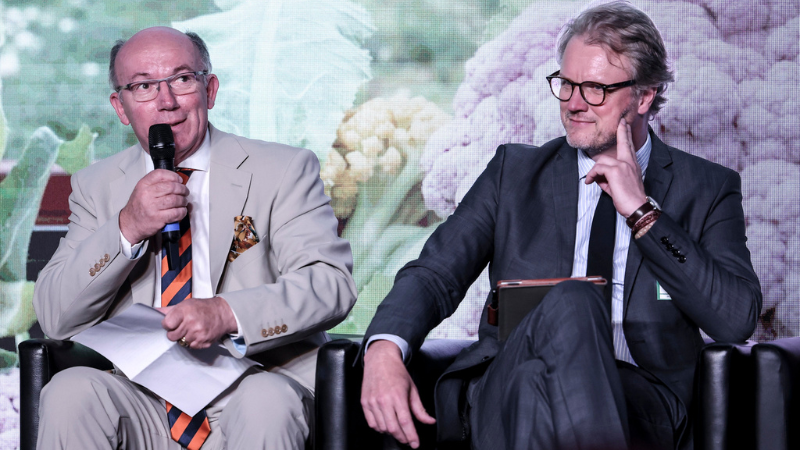
Photo credit: ©FAO/Alessandra Benedetti
“Without agriculture, the world cannot survive” – WFO President
That is why making farmers sit around the table and involving them in shaping the direction towards sustainable food systems is crucial.
He closed by reiterating that farmers are ready to do their part and work with the other actors in the food systems.
He called for a food value chain that is fair, transparent, and respectful of roles and responsibilities. This involves increased collaboration instead of top-down decisions and shared responsibility instead of imposed frameworks on the farmers.
Furthermore, the WFO President highlighted the need for innovation and technology that serve farmers to perform better rather than replace their work.
